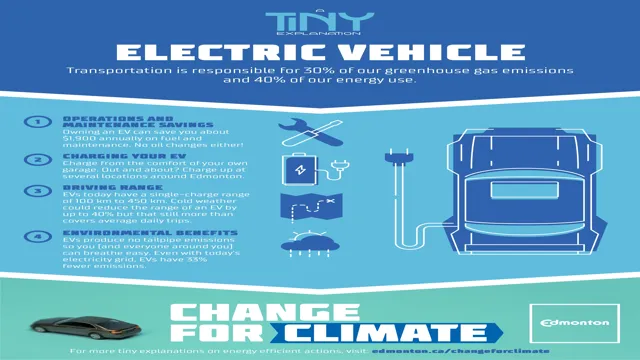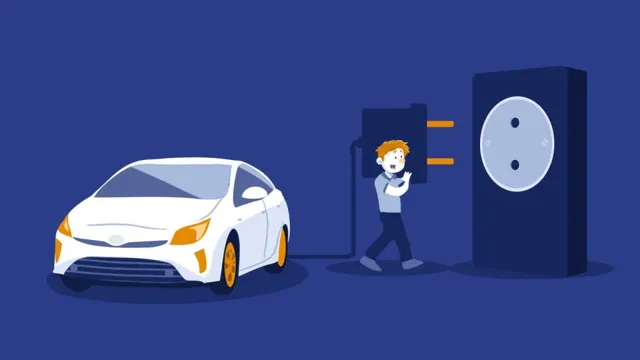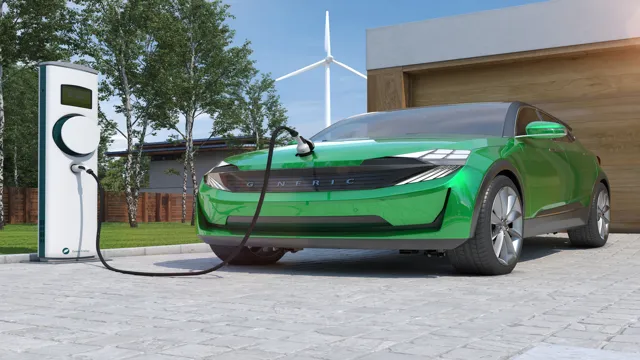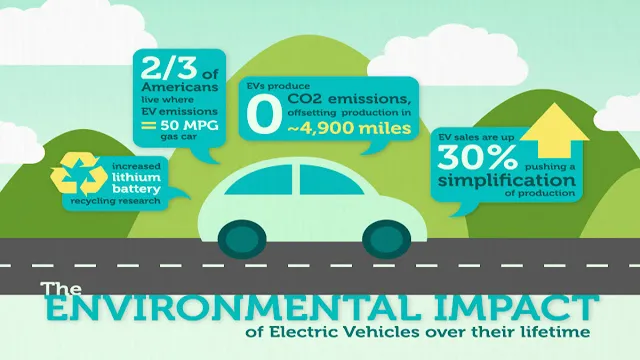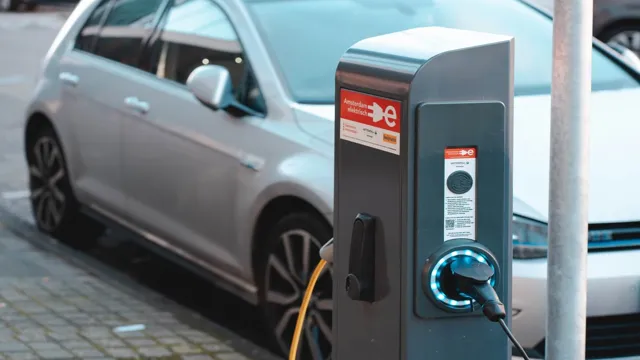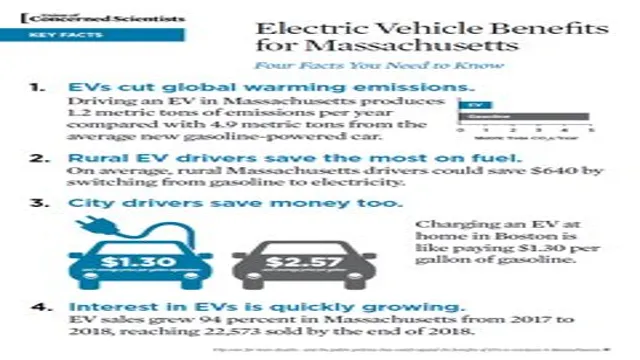Driving Towards a Greener Future: Exploring the Pollution-Busting Benefits of Electric Cars
Looking to buy a new car? Have you considered going electric? With the rise in popularity of electric vehicles, more and more drivers are making the switch to these eco-friendly machines. But what makes them so special? For starters, electric cars are powered by electricity instead of gasoline, making them much better for the environment. They produce zero emissions, making them ideal for those looking to reduce their carbon footprint.
But electric cars aren’t just good for the planet, they’re also incredibly convenient. Imagine never having to stop for gas again! And with advancements in technology, electric cars are becoming more affordable and practical than ever before. So, if you’re in the market for a new car and want to make a positive impact on the environment, consider going electric – your wallet (and the planet) will thank you!
Reducing Pollution
Electric cars are not only great for the environment, but they also have significant benefits in reducing air pollution. A study by the Union of Concerned Scientists found that driving an electric car emits less than half the amount of CO2 as driving a gasoline car. Electric cars produce zero emissions, making them extremely effective in reducing pollution in urban areas.
The adoption of electric cars can contribute to improving air quality and reducing respiratory illnesses, especially in densely populated cities where pollution levels are high. Apart from being environmentally friendly, electric cars are also much quieter and produce less noise pollution, making them a perfect fit for urban environments. Electric cars are not only efficient in saving money on fuel costs, but they offer a sustainable solution to the pollution crisis we are facing.
Electric Cars vs Gasoline Cars
When it comes to reducing pollution, electric cars have a clear advantage over gasoline cars. Traditional engines emit harmful gases such as nitrogen oxides, carbon monoxide, and hydrocarbons into the atmosphere, contributing to air pollution and climate change. In contrast, electric cars produce zero emissions at the tailpipe, making them a much cleaner option for the environment.
Additionally, electric cars are often charged using renewable energy sources such as solar or wind power, further reducing their carbon footprint. Choosing an electric car over a gasoline car is an impactful way to help reduce pollution and contribute to a healthier planet.

Benefits of Electric Cars for the Environment
Electric cars are becoming an increasingly popular choice among consumers concerned about environmental issues and sustainability. One of the key benefits of electric vehicles is that they help to reduce pollution levels. Traditional gasoline-powered cars emit harmful pollutants into the air, contributing to air pollution and climate change.
In contrast, electric cars produce no tailpipe emissions, meaning they don’t emit any pollutants from the exhaust. This not only helps to decrease air pollution levels but can also improve overall air quality and reduce health risks associated with exposure to toxic air pollutants. The transition to electric cars could help to create a cleaner, healthier environment for everyone.
Health Benefits
The shift towards using electric cars is not only beneficial in terms of reducing air pollution, but it also has positive effects on our health. Traditional gasoline-powered cars emit harmful pollutants such as carbon monoxide, nitrogen oxides, and particulate matter. These pollutants can cause a wide range of health problems such as respiratory issues, heart disease, and even cancer.
By switching to electric cars, we can significantly reduce our exposure to these harmful pollutants, leading to improved health and wellbeing. Additionally, the use of electric cars can also lead to a reduction in noise pollution, which can have a positive impact on mental health and stress levels. As electric cars become more widely available and affordable, we have the opportunity to make a significant impact on both the health of our planet and the health of ourselves.
So, why not make the switch to electric and enjoy the benefits of reduced pollution and improved health?
Reduced Air Pollution and Respiratory Issues
Air pollution is a major issue in many urban areas, and it has been linked to a variety of respiratory problems. However, recent reductions in air pollution levels have led to a number of health benefits for those who live in affected areas. One of the most significant benefits is a decrease in respiratory issues, including asthma and chronic obstructive pulmonary disease.
This is because inhaling pollutants like particulate matter and ozone can cause inflammation in the lungs, which can exacerbate these conditions. By reducing air pollution levels, we can help to improve the overall health of our communities and make them safer, more livable places to be. So whether you live in a highly contaminated area or not, it is important to do your part to reduce air pollution by driving less, using public transportation or biking, and supporting policies that prioritize clean air and public health.
Decreased Noise Pollution and Stress Levels
One potential benefit of decreased noise pollution in our surroundings is the positive impact it can have on our stress levels and overall health. Research has shown that exposure to excessive noise can lead to a number of negative health outcomes, including increased levels of stress, anxiety, and even heart disease. By reducing the amount of noise in our environment, whether through the use of sound barriers or the promotion of quieter activities, we can help to mitigate these risks and improve our well-being.
From a practical standpoint, this could mean taking steps to reduce noise levels in our homes, workplaces, and public spaces, or even seeking out natural areas where the sounds of birds singing and leaves rustling can help to calm our minds and bodies. By prioritizing peace and quiet in our lives, we can reap the many health benefits that come with a quieter, more tranquil environment.
Economic Benefits
Electric cars are gaining popularity as an eco-friendly alternative to traditional gas-powered vehicles, and for good reason – they offer a variety of economic benefits. For starters, they are much cheaper to maintain than their gas counterparts, as they have fewer moving parts and require less frequent maintenance. On top of that, electric cars are much cheaper to fuel, with charging costs significantly lower than the cost of gas.
And if that wasn’t enough, electric cars also have a longer lifespan due to their simpler engines and less frequent need for replacements. By using electric cars instead of gas vehicles, we can not only reduce pollution but also save money in the long run. Whether it’s in the form of lower maintenance costs, cheaper fuel, or longer lifespans, choosing an electric car can be a smart financial decision.
Lower Operating Costs and Maintenance
One of the most attractive aspects of utilizing advanced technology is the lower operating costs and maintenance. By upgrading to newer, more efficient machinery or software, businesses can enjoy significant cost savings over time. For instance, incorporating artificial intelligence or automation in manufacturing processes can help to speed up production, reduce errors, and eliminate the need for hiring additional staff.
This translates to less money spent on wages, insurance, and other overheads. Moreover, these technologies often require less maintenance, minimizing downtime and disruptions to operations. Consequently, businesses can achieve higher profits and improved ROI while staying competitive in their respective markets.
Overall, implementing advanced technology into business practices can result in significant economic benefits, especially over long-term use.
Job Creation in the Renewable Energy Industry
Renewable energy has become a powerful tool for job creation worldwide. Through technological advancement, innovations within the renewable energy sector have created numerous jobs over recent years. This growth in the industry is attributed to the increasing demand for cleaner and more sustainable sources of energy, which has resulted in a sharp rise in the number of renewable energy companies and projects globally.
Apart from its ecological benefits, an increase in renewable energy production has economic benefits such as job creation in different sectors. Indeed, the financial effects of the renewable energy industry are undeniable. Renewable energy investments have led to the creation of millions of jobs across the globe, varying from construction, maintenance, research, and development, among others.
These jobs have been instrumental in creating wealth and reducing poverty levels in many countries. Generally, the renewable energy sector has proven to be a catalyst for economic growth, making it important for policymakers to support the industry in every way possible. So, Renewable energy creates jobs while protecting the environment in which we live.
The Future of Electric Cars
Electric cars are the future of our transportation system, and they offer numerous benefits over traditional internal combustion engine vehicles. One of the most significant benefits is the reduction of pollution. Electric cars emit zero tailpipe emissions, which means they produce no harmful pollutants that negatively impact air quality.
This is great news for those living in heavily congested urban areas, where air pollution is a significant issue. Electric cars also reduce greenhouse gas emissions, which contribute to climate change. When powered by renewable energy sources like solar or wind power, electric cars offer a sustainable solution to reduce our reliance on fossil fuels.
In addition to environmental benefits, electric cars also provide economic advantages, such as lower fuel and maintenance costs. The future of transportation is electric, and it offers a cleaner, more sustainable way to move forward.
Conclusion
In conclusion, electric cars have proven to be a boon for our environment and public health. By emitting significantly lower levels of harmful gases, reducing noise pollution, and conserving precious resources, electric cars have become a shining example of how technology can work in harmony with nature. As we move towards a more sustainable and eco-friendly future, electric cars are poised to play a significant role in mitigating climate change and improving the quality of life for us and future generations.
So, next time you hit the road, consider an electric car, and enjoy the ride guilt-free, knowing that you are doing your bit to protect our planet.”
FAQs
How do electric cars help reduce pollution?
Electric cars omit no emissions or pollutants while driving, leading to a reduction in air pollution and improved air quality.
What is the benefit of owning an electric car over a gas-powered car?
Electric cars are more energy-efficient and cost less to operate and maintain than gas-powered cars. This can result in lower fuel and maintenance costs over time.
Are there any tax incentives for purchasing an electric car?
Yes, many states and the federal government offer tax incentives for purchasing an electric car. These incentives can include tax credits or exemptions for sales tax, registration fees, and other related expenses.
How does the production and disposal of electric cars impact the environment?
Although electric cars produce no emissions while driving, the production and disposal of electric car batteries can have a negative environmental impact. However, recycling programs and advancements in battery technology are helping to mitigate these impacts.

